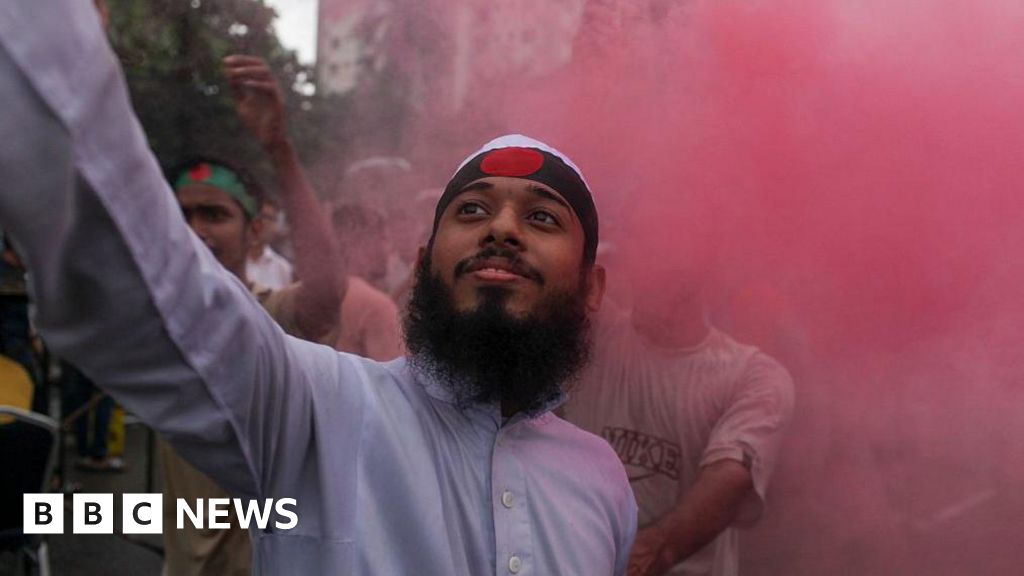生成中...【新闻摘要】
"孟加拉国后哈西娜时代:街头狂欢与暗流涌动!虽然临时政府高调庆祝'第二次解放',但女性权益改革报告刚出炉就被伊斯兰强硬派当街烧毁——这些号称'男人女人永不可能平等'的抗议者,居然还有代表在临时政府顾问团里!更魔幻的是,被赶下台的前总理哈西娜躲在印度拒不回国,她的支持者却在国内遭遇'私刑复仇'。如今这个1.7亿人口的国家,一边是学生领袖宣称'民主空气前所未有的自由',一边是苏菲派神庙被砸、女明星遭骚扰。看来这场'政变'只是换了批人坐庄,骨子里的男权专制和宗教极端依旧坚挺!"
---
**Post-Hasina Bangladesh celebrates freedom while facing mounting challenges**
后哈西娜时代的孟加拉:在庆祝自由的同时面临重重挑战
**2 days ago Share Save Anbarasan Ethirajan South Asia regional editor Share Save**
2天前 分享 保存 安巴拉桑·埃蒂拉詹 南亚地区主编
---
**NurPhoto via Getty Images The capital was filled with jubilant scenes as people marked the anniversary of Sheikh Hasina fleeing Bangladesh**
NurPhoto/Getty Images 首都达卡充满欢庆场景,人们纪念谢赫·哈西娜逃离孟加拉国一周年
**Thousands of people gathered in central Dhaka this week celebrating the anniversary of the downfall of Prime Minister Sheikh Hasina and the promise of a new future for the country. In the pouring rain, the head of the interim government, Muhammad Yunus, leaders of various political parties and activists stood united as they unveiled plans for a"New Bangladesh". Across the country, people waved the national flag in concerts, rallies and special prayer sessions marking what some activists are calling the"second liberation" of this Muslim-majority nation of 170 million people. But these jubilant scenes did not tell the whole story in the last 12 months. Rights groups say there have been instances of lynching, mob violence, revenge attacks, and a resurgence of religious extremism which threaten to derail the country's journey towards democracy. Meanwhile, the ex-prime minister who was so spectacularly pushed from power watches from the sidelines of exile in neighbouring India, denying her role in the deadly crackdown and refusing to return to face charges that amount to crimes against humanity.**
本周数千人聚集在达卡市中心,庆祝总理谢赫·哈西娜下台一周年及国家新未来。临时政府首脑穆罕默德·尤努斯与各政党领袖在暴雨中共同公布"新孟加拉"计划。全国上下通过音乐会、集会祈祷庆祝这场被活动家称为1.7亿穆斯林国家的"第二次解放"。但欢庆场景掩盖不了过去12个月的暗流——人权组织报告私刑、暴民暴力、报复袭击事件频发,宗教极端主义复苏可能破坏民主进程。而流亡印度的前总理否认镇压指控,拒绝回国面临反人类罪诉讼。
---
**"I think we had a regime change, not a revolution. Fundamentally, misogyny remains intact, male dominance remains unchallenged," Shireen Huq, a women's rights activist, tells the BBC. Ms Huq headed the Women's Affairs Reform Commission, one of the bodies set up by the interim government to bring social and political changes reflecting the uprising's goals of democracy and pluralism. In April this year, the 10-member body submitted its report calling for gender equality - particularly over women's right to inheritance and to divorce, called for criminalising marital rape and protecting the rights of sex workers, who face abuse and harassment from police and others. The next month, thousands of Islamist hardliners took to the streets against the proposed recommendations, saying they were anti-Islamic and that"men and women can never be equal". The protesters - led by Hefazat-e-Islam, which has a representative on the interim government's cabinet of advisers - demanded the disbanding of the women's commission, and its members punished for making those proposals. Subsequently, no detailed public debate was held on the commission's proposals."I was disappointed that the interim government did not support us enough when we were subjected to lots of abuses by Hefazat-e-Islam," Ms Huq says. Yunus's office did not respond to a request for comment on the allegation.**
女权活动家希琳·胡克告诉BBC:"我们只是换了政权而非革命,厌女症和男权统治依然根深蒂固"。她领导的妇女事务改革委员会4月提交报告,主张遗产继承权、离婚权平等,要求将婚内强奸入刑并保护性工作者权益。5月数千伊斯兰强硬派上街抗议这些"反伊斯兰"建议,要求解散委员会并惩处成员——值得注意的是,领导抗议的伊斯兰护卫队在临时政府顾问团占有席位。胡克批评政府未给予足够支持,尤努斯办公室对此不予置评。
---
**Nayem Ali/ CA Press Wing Shireen Huq, who stands to the left of Muhammad Yunus, is disappointed little action has been taken to improve women's rights**
Nayem Ali/CA Press Wing 站在尤努斯左侧的希琳·胡克对妇女权益改革停滞感到失望
**Activists say the protests were just one example of how the hardliners - who had been pushed to the fringes during Hasina's tenure - had become emboldened. They have also objected to girls playing football matches in some parts of the country, women celebrities participating in commercial promotional events, and, in some instances, have harassed women in public places because of how they were dressed. But it is not just women who have borne the brunt. Hardliners have also vandalised scores of shrines of minorities like the Sufi Muslims in the past year. But, even as people like Ms Huq look to the future, Bangladesh is still confronting its past. There's a groundswell of anger against Hasina's Awami League-led government, which is accused of unlawful killings, enforced disappearances, and brutal suppression of dissent."You have a huge constituency of people in Bangladesh who wanted to see not just accountability but vengeance and retribution," says David Bergman, a journalist and a long-time Bangladesh watcher.**
活动家指出,哈西娜时期被边缘化的强硬派正在反扑:阻挠女足比赛、骚扰参加商业活动的女明星、破坏苏菲派穆斯林神庙。与此同时,人民联盟前政府被指控的法外处决、强迫失踪等罪行引发复仇浪潮。长期观察孟加拉的记者伯格曼表示:"大量民众不仅要求追责,更渴望报复。"
---
**However, he says,"one can't continue with the injustices that existed in the Awami League period and just replicate them in the current period". But that is what Hasina's Awami League claims is happening. It says hundreds of its supporters have been lynched over the past year - allegations the interim government denies. Several journalists and supporters of the Awami League have been jailed for months on murder charges. Their bail applications have been repeatedly rejected by courts. Critics say there is no thorough investigation over those murder accusations, and they have been kept in detention only because of their previous support for the Awami League.**
伯格曼警告不应"用新不公替代旧不公",但人民联盟指控过去一年数百支持者遭私刑——临时政府否认这些指控。多名亲人民联盟记者和支持者被控谋杀羁押数月,保释申请屡遭驳回,批评者认为这是政治迫害。
---
**NurPhoto via Getty Images Anger remains towards Sheikh Hasina, the former prime minister**
NurPhoto/Getty Images 民众对前总理谢赫·哈西娜的愤怒仍未平息
**"It takes time for stability to return after a major uprising. We are in a transitional phase," acknowledged Nahid Islam, a student leader who helped spearhead the protests and acted as an adviser to the interim government until recently. Islam agrees there are challenges facing the country, but dismisses concerns of growing Islamist influence, saying it was"part of a broader cultural struggle" that has existed for years. But there are also signs of progress. Many credit the interim government with stabilising the country's economy and, contrary to fears, the banking sector has survived. Bangladesh has met its loan obligations, kept food prices largely stable, and maintained robust foreign exchange reserves - currently at $30bn (£22bn) - thanks to remittances and international loans. Exports have also held steady. Then there are other, less easily measurable things. Islam argues that, since the fall of Hasina,"a democratic environment has been established, and now everyone can express their views freely". That is something to be celebrated in a country shaped by a history of political turbulence, military coups, assassinations, and bitter rivalries. But that is being questioned by some. The influence of student leaders over the interim government has drawn criticism. They were given the roles in recognition for their leadership in the unprecedented protests which toppled Hasina.**
前学生领袖纳希德·伊斯兰承认"重大变革后需要过渡期",认为伊斯兰势力抬头是"长期文化冲突的延续"。他肯定临时政府的经济成绩:稳定物价、维持300亿美元外汇储备、出口企稳,更强调"民主环境已建立"。但学生领袖在政府中的影响力引发争议,这些职位是对他们领导推翻哈西娜抗议的奖励。

